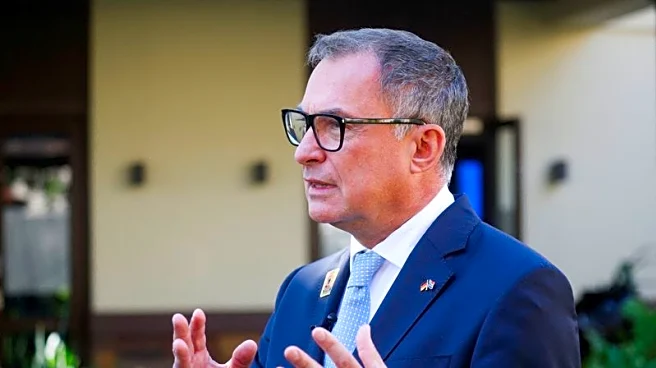What's Happening?
A recent survey conducted by Charles Schwab reveals that 45% of investors are showing interest in alternative investments, which include assets outside traditional holdings such as private-market assets,
real estate, commodities, and cryptocurrencies. Financial advisors are suggesting exchange-traded funds (ETFs) as a smart way to gain exposure to these alternative investments due to their ability to sidestep complexities like liquidity issues. The survey, which polled 2,400 individuals, indicates a growing trend among younger investors who are disillusioned with conventional holdings, a phenomenon referred to as 'financial nihilism.' Additionally, President Trump signed an executive order in August to facilitate the inclusion of alternative products in workplace retirement plans, while the U.S. Securities and Exchange Commission is making changes to expedite the launch of spot crypto ETFs.
Why It's Important?
The increasing interest in alternative investments signifies a shift in investor behavior, particularly among younger demographics who are seeking diversification beyond traditional assets. This trend could lead to significant changes in the financial advisory industry as advisors adapt to meet the demand for alternative investment strategies. The use of ETFs to access these investments offers a more liquid and accessible option for investors, potentially broadening the market for alternative assets. The regulatory changes and executive orders could further ease access to these investments, impacting retirement planning and investment strategies across the U.S.
What's Next?
As regulatory frameworks evolve, more investors may gain access to alternative investments through workplace retirement plans and ETFs. Financial advisors will likely continue to explore and recommend innovative strategies to meet the growing demand for diversification. The financial industry may see an increase in the development and offering of ETFs focused on alternative assets, potentially leading to new investment products and opportunities.
Beyond the Headlines
The shift towards alternative investments raises questions about the long-term impact on traditional investment vehicles and the financial industry as a whole. Ethical considerations may arise regarding the transparency and risk associated with these investments, prompting further scrutiny and regulation. The cultural shift towards 'financial nihilism' among younger investors could influence broader societal attitudes towards wealth and investment.










